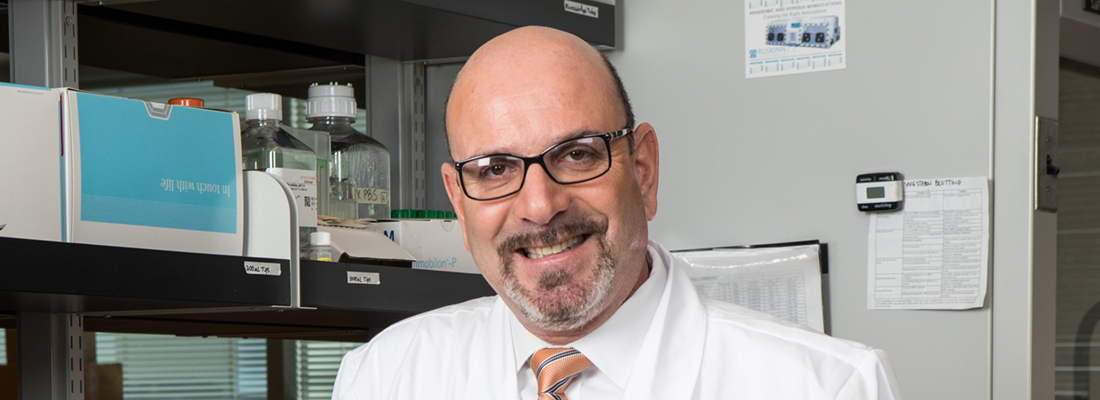Abraham Schneider, DDS, PhD | University of Maryland School of Dentistry
View Full 2017-2018 Champions of Excellence Gallery Find Out More About the Champions of Excellence Campaign
According to the American Cancer Society, about 51,540 people will get oral and oropharyngeal cancer in 2018. Of these, an estimated 10,030 — more than one person per hour each day — will die from the disease.
Numbers like these are sobering, but they inspire researchers like Abraham Schneider, DDS, PhD, at the University of Maryland School of Dentistry to search for ways to stop cancer before it strikes.
Schneider grew up in Lima, Peru, where he received his dental degree before coming to the United States in 1991 for advanced training and specialization in periodontics.
After being in clinical practice for a few years, he decided to pursue a PhD in oral health sciences at the University of Michigan. There, he met a group of scientists at the dental school who were collaborating with the medical school’s cancer center to study prostate cancer and bone metastasis.
Prostate cancer had personally touched Schneider’s life when one of his close family members died from the disease, motivating him to join his colleagues in hopes of finding a solution.
In 2005, he came to the University of Maryland, Baltimore (UMB) with his wife, Monica, also a faculty member, to continue to teach and conduct research at the School of Dentistry while also working with the National Institute of Dental and Craniofacial Research (NIDCR). It was working with the NIDCR that first exposed him to the study of oral cancer.
Today, he is an associate professor in the Department of Oncology and Diagnostic Sciences, where he is studying the drug metformin and its relation to reducing the risk of developing cancer.
Metformin is a relatively inexpensive, nontoxic, and well-tolerated drug currently used by more than 120 million people worldwide. Most who use metformin do so to lower their blood sugar in relation to diabetes. After research revealed that those diabetic patients taking metformin had a lower risk of cancer, Schneider became interested in learning more about the non-diabetic effects of the drug.
Originally, Schneider, with collaborators at the NIDCR, researched oral cancer development in mice. The results? About 90 percent of the mice given metformin never acquired fully formed cancer.
Schneider studies metformin’s effects at the cellular level: how metformin gets into the cells and how his team can develop the drug to work more efficiently. So far, metformin appears to be most successful when used in the early stages of cancer development.
Yet, Schneider isn’t limiting himself to just cancer prevention. He is also addressing the potential aftereffects of cancer treatment by applying these strategies to regenerating oral and craniofacial bone tissue. To do so, he combines metformin with specific stem cells. If successful, the findings of this research could create new approaches to enhance skeletal regeneration after the consequences of tumor resection, trauma or infection.
Not only is Schneider interested in metformin because of its unexpected positive effects, but also because it is so affordable.
“Metformin could be great for people who can’t afford costly treatment because it is an inexpensive and well-received drug,” he says.
He has used his five-year, $1.25 million grant from the National Institutes of Health (NIH) to explore the impact of metformin in the chemoprevention and treatment of oral cancer.
“Results emerging from these studies may ultimately contribute to the implementation of novel personalized approaches to control the development and progression of oral cancer,” he says.
For Schneider, the most effective research is conducted through interdisciplinary collaboration, which abounds at UMB.
“Being proactive in reaching out to other experts at UMB who complement my own research studies has been key, I believe, to advance my research program,” he says. “A cross-disciplinary, team-based research approach that is based on the diversity of opinion generated from different scientific backgrounds broadens, by many folds, the possibility of answering specific research questions.”
The collaboration he has found at UMB is unlike any other he has been a part of. Specifically, Schneider has worked with faculty from the schools of pharmacy, medicine, and dentistry on this project and others. The access to a diverse and accomplished faculty for interdisciplinary research, along with the proximity of UMB to NIH and major hospitals, has been extremely helpful for advancing his studies.
Outside of his research, Schneider says the most gratifying part of his job is seeing his students in the School of Dentistry grow professionally and personally.
“They start off knowing very little, but in just a few years they are much more knowledgeable and confident,” he says. “It truly makes my life much nicer to see how our students and postdoctoral fellows grow at UMB.”



